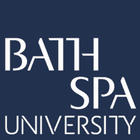About Fine Art BA (hons) in Bath Spa University
A studio-centred fine arts degree, encouraging independent enquiry and delivered by practising artists.
- Outstanding programme of visiting speakers, including internationally acclaimed artists and curators.
- Exceptional academic and technical support in painting, sculpture, printmaking, drawing, film, sound, performance and photography.
- Exciting collaborative opportunities with external partners such as Tate Exchange, Porthleven Prize and Gane Trust Travel Award.
This studio-centred course offers you the opportunity to explore the disciplines of painting, sculpture, performance, installation, printmaking, and lens-based and digital media.
The Fine Art course is characterised by a profound synergy between academic and technical teaching and learning. You'll work towards an independent, critical and reflective practice, supported through tutorials, workshops, lectures, study trips and, in the first year, weekly contact with your personal tutor.
Our lecturers are engaged in their own practice as artists, bringing a contagious energy to the dialogue and exchange with students. In this community, students, tutors and dedicated technicians work together to understand and develop what contemporary art can or should be today. You’ll develop the skills you need for a successful career - as an artist or in a related profession.
Overview
The course is aimed at the development of studio practice in painting, drawing, sculpture, film, photography, performance and sound. The structure of the course leaves room for not knowing, experimentation, discovery, risk and innovation.
This course promotes curiosity, risk and innovation. It aims to develop your skills of analysis, self-criticism, reflection and communication - both verbally and visually - as well as the practical skills you need.
It is critical that you understand current and historical debates in art, and through a programme of Contextual Studies we encourage you to consider how theory and contextual knowledge is embedded in practice.
Delivered by specialists in the field, the Professional Practice module aims to equip you with the skills you need to build a successful future. Taught sessions support you to photograph work, build blogs/websites, write artist statements, fundraise, network, manage projects and curate exhibitions.
Opportunities
Work placements, industry links and internships
Our students take up a variety of work placements, internships or opportunities in the creative industry from the ICA, Hauser and Wirth, the Holburne Museum and Spike Island to working as assistants with internationally acclaimed artists or prestigious commissions in nationally acclaimed heritage sites.
Our Fine Art department is one of Tate Exchange's official associates, and we are excited to see what being part of this initiative will bring to the course.
Careers
Our graduates go on to become, among other things, professional practising self-employed artists, they become curators in established galleries or set up their own artist run spaces. We have alumni who are teachers or work in gallery education; others have gone onto work in conservation, TV, or Art Therapy.
Many of our alumni go onto further study at some of the UK’s top postgraduate courses including the Slade School of Fine Art, Chelsea School of Art and Design, The Royal College of Art, The Royal Academy Schools, Glasgow School of Art and the Courtauld Institute.
Academic qualification equivalents
- Higher Secondary School Certificate/Indian School Certificate (standard XII) from the following boards CBSE/CISCE/WBCHSEB, with 65%, including grade C in at least five subjects.
English language requirements (one of the below):
- IELTS:Academic 6.0 overall This must include a minimum of 5.5 in Listening, Speaking, Reading and Writing.
- TOEFL iBT: A total of 72, to include a minimum 18 in Reading, 17 in Listening, 20 in Speaking, and 17 in Writing.
- PTE: This must include a minimum of 51 in Listening, Speaking, Reading and Writing.
Bath Spa University Highlights
| Type |
Public |
| Campus Setting |
Urban |
| Tuition Fees for International Students (full-time degrees in 2020-2021) |
13,700 GBP - 15,300 GBP (varies with the courses) |
| Campus Housing Capacity |
25% |
| Student Retention Rate |
89% |
| Scholarship Availability |
Yes |
| Applications Accepted |
Online |
| Work-Study |
Available |
| Intake Type |
Yearly |
| Mode of Program |
Full time and part-time |
Bath Spa University Average Tuition Fees And Other Expenses
International students joining the Bath Spa University are required to pay 70% of the tuition fees on or before arrival and commencement of the course. All payments should be made in £ sterling and the easiest way to make a payment is via Flywire. However, the payment can also be made through credit/debit card.
International students should open a UK bank account as soon as possible after arrival.
The estimated cost of attendance depends on several factors like the program applied for, tuition, books, fees, housing, dining, and personal items.
| Expenses In GBP |
Undergraduate (per annum) |
Graduate (per annum) |
| Tuition Fee for International Students (full-time courses) |
13,700- 15,300 (varies with the field of study chosen) |
13,700- 15,300 (varies with the field of study chosen) |
| Career and Professional Development Fees |
145 |
145 |
| Housing and Rooms |
8,412 |
8,412 |
| Health Insurance |
150 |
150 |
| Books and Supplies |
500 |
500 |
| Meals |
3,225 |
3,225 |
| Personal Expenses |
792 |
792 |
